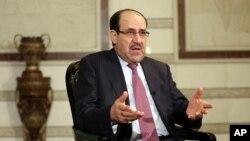Former Iraqi prime minister Nouri al-Maliki, accused in a parliamentary debate Monday of responsibility in the fall of Iraq's second largest city Mosul to IS militants in June 2014, is blaming the disaster on Turkish President Recip Tayyip Erdogan and Kurdish regional President Massoud Barzani.
Maliki, who was stripped of his mostly ceremonial post as one of Iraq's three vice presidents in a reform plan by his successor Haidar al-Abadi, fled to Iran several days ago.
Addressing supporters in the Iranian capital Tehran, Maliki accused Saudi Arabia of aggravating the Sunni-Shi'ite conflict in Iraq and the region. He also accuses other regional players in the conflict, to the applause of the mostly Shi'ite crowd.
Maliki also blasted adversaries Turkey and Kurdistan for plotting the disintegration of his country. On his Facebook page, he accused the leaders of both of handing the Iraqi city of Mosul to the Islamic State last year.
Blame game
The fall of Mosul was the subject of an Iraqi parliament debate Monday, in which a 200-page report with interviews of more than 30 former Iraqi military and political leaders was presented to determine who was responsible for the fall of the city.
Iraqi parliament speaker Selim al-Jabbouri told journalists that pressure was put on the committee investigating the fall of Mosul to remove the names of certain prominent figures, but that all those involved in the setback will be prosecuted in court.
United Arab Emirates-based Middle East analyst Theodore Karasik argues that the debate over the fall of Mosul is part of the political struggle being waged by Prime Minister Haidar al-Abadi to reform Iraq's political system
“(Grand Ayatollah) Ali Sistani sent out his word that Abadi should start this anti-corruption campaign and clean out those who made mistakes in the past years. Maliki of course is going to be a main target because it was under his reign that Iraq remained a disaster. So, this has created the situation that Maliki is being held responsible particularly with the Mosul incident,” he said.
Karasik says Maliki's accusations are shared by others who claim Ankara “turned a blind eye to the Islamic State problem at the time,” and that the Kurds did not come to the rescue of the Iraqi government when they could have.




